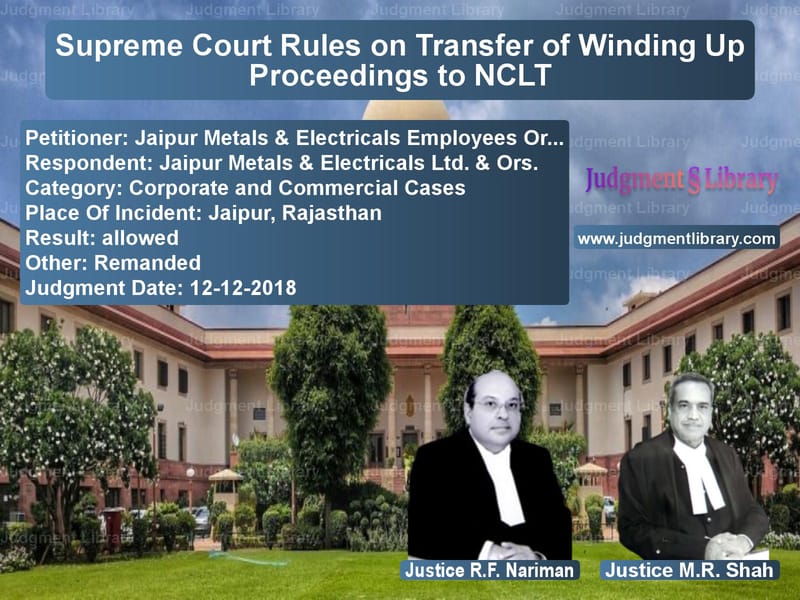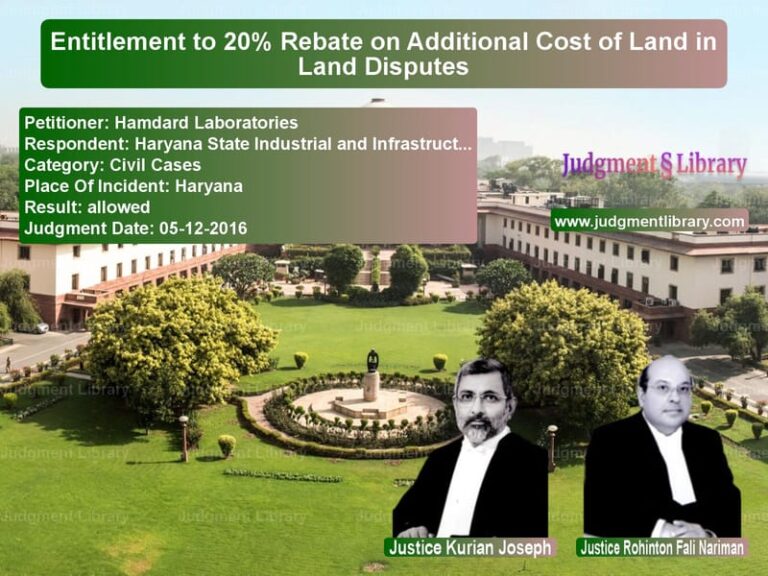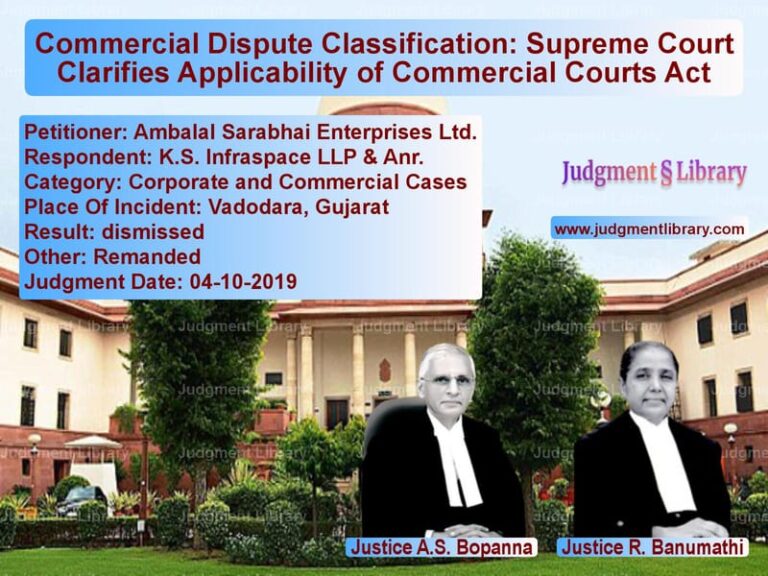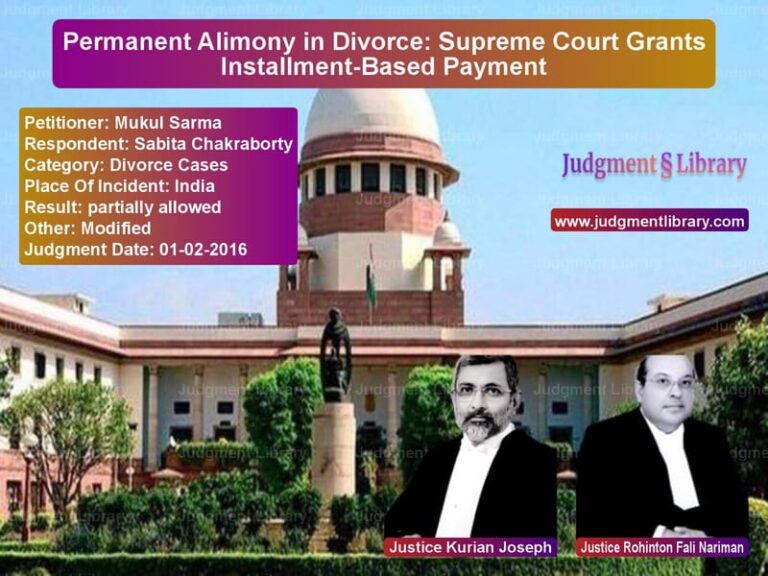Supreme Court Rules on Transfer of Winding Up Proceedings to NCLT
The case of Jaipur Metals & Electricals Employees Organization v. Jaipur Metals & Electricals Ltd. & Ors. is a crucial ruling on corporate insolvency and the jurisdictional conflict between the National Company Law Tribunal (NCLT) and High Courts in winding up cases. The Supreme Court overturned a Rajasthan High Court order that refused to transfer the winding-up proceedings to NCLT and set aside the NCLT’s admission of an insolvency application. The judgment clarifies the applicability of the Insolvency and Bankruptcy Code, 2016 (IBC) in corporate winding-up matters.
Background of the Case
The respondent company, Jaipur Metals & Electricals Ltd., had been financially distressed for years. On September 30, 1997, its account was declared a non-performing asset (NPA). Following this, the company was referred to the Board for Industrial and Financial Reconstruction (BIFR) under the Sick Industrial Companies (Special Provisions) Act, 1985 (SICA). On September 26, 2002, the BIFR recommended the company’s winding up, forwarding the case to the Rajasthan High Court.
Over the years, various efforts to revive the company failed. The government of Rajasthan attempted to restructure the company, but it was unsuccessful. Consequently, the High Court provisionally attached an official liquidator to oversee its affairs on December 7, 2017.
Key Issues in the Case
- Whether the High Court should have transferred the winding-up proceedings to the NCLT.
- Whether the NCLT had jurisdiction to admit a Section 7 IBC application while winding-up proceedings were pending in the High Court.
- Whether Section 238 of the IBC (overriding effect) applied to ongoing winding-up cases.
Arguments by the Appellant (Employees’ Organization)
The appellant, represented by Senior Advocate Sidharth Luthra, contended:
- As per Section 434 of the Companies Act, 2013, all pending winding-up proceedings should be transferred to the NCLT.
- The High Court erred in refusing to transfer the case despite clear provisions in the IBC and Companies (Transfer of Pending Proceedings) Rules, 2016.
- The financial creditor, Alchemist Asset Reconstruction Company Ltd., had the right to file an independent insolvency application under Section 7 of the IBC, even if winding-up proceedings were pending.
- The High Court’s order contravened the non-obstante clause in Section 238 of the IBC, which gives the Code overriding authority over other laws.
Arguments by the Respondents
The respondents, including the state government and financial creditors, argued:
- Since the High Court had initiated winding-up proceedings before the IBC came into force, it retained jurisdiction.
- The 2016 Transfer Rules did not mandate an automatic transfer to the NCLT.
- The IBC’s provisions should not be applied retrospectively to cases initiated before the Code was enacted.
Supreme Court’s Observations
The Supreme Court examined the legislative intent behind the IBC and its relationship with the Companies Act. It made the following key observations:
1. High Court Must Transfer Winding Up Cases to NCLT
The Court held that Section 434 of the Companies Act, as amended by the IBC, mandated the transfer of winding-up cases to the NCLT:
“All proceedings under the Companies Act, 1956, including winding-up cases, shall stand transferred to the Tribunal unless a winding-up order has already been passed.”
2. IBC Overrides Companies Act and Other Laws
The Court emphasized the supremacy of the IBC, stating:
“Section 238 of the IBC has an overriding effect. If there is any inconsistency between the IBC and the Companies Act, 2013, the provisions of the IBC will prevail.”
3. NCLT Had Jurisdiction to Admit the Section 7 IBC Application
The Court ruled that even though winding-up proceedings were pending in the High Court, an independent financial creditor could still file a separate Section 7 IBC application before the NCLT:
“A financial creditor has an independent statutory right to initiate an insolvency resolution process under the IBC, irrespective of ongoing winding-up proceedings.”
4. Employees’ Claims Will Be Protected Under IBC
The Supreme Court assured that the IBC framework sufficiently safeguards workers’ rights:
“The resolution process under the IBC ensures fair treatment of employees’ dues, and workmen are recognized as operational creditors.”
Supreme Court’s Judgment
The Supreme Court ruled:
- The High Court’s order refusing to transfer the case to NCLT was set aside.
- The pending winding-up proceedings were transferred to the NCLT.
- The NCLT’s admission of the Section 7 IBC application was upheld.
- The Rajasthan High Court was directed to dispose of any related pending matters accordingly.
Impact of the Judgment
This ruling has several significant implications:
- Clarifying Jurisdiction: It establishes that High Courts must transfer pending winding-up cases to NCLT under the IBC.
- Strengthening the IBC Framework: The decision reinforces that insolvency proceedings take precedence over company winding-up laws.
- Protecting Financial Creditors: The ruling affirms the rights of financial creditors to initiate IBC proceedings even if winding-up cases are ongoing.
- Ensuring Employee Protection: The Court reassured that workers’ dues would be addressed under the IBC framework.
Conclusion
The Supreme Court’s judgment in Jaipur Metals & Electricals Employees Organization v. Jaipur Metals & Electricals Ltd. reinforces the dominance of the IBC in corporate insolvency matters. By transferring the case to the NCLT and upholding the financial creditor’s rights, the ruling clarifies the legal framework governing winding-up cases and insolvency resolutions in India. This judgment will serve as a key precedent in corporate litigation and insolvency law.
Petitioner Name: Jaipur Metals & Electricals Employees Organization.Respondent Name: Jaipur Metals & Electricals Ltd. & Ors..Judgment By: Justice R.F. Nariman, Justice M.R. Shah.Place Of Incident: Jaipur, Rajasthan.Judgment Date: 12-12-2018.
Don’t miss out on the full details! Download the complete judgment in PDF format below and gain valuable insights instantly!
Download Judgment: Jaipur Metals & Elec vs Jaipur Metals & Elec Supreme Court of India Judgment Dated 12-12-2018.pdf
Direct Downlaod Judgment: Direct downlaod this Judgment
See all petitions in Bankruptcy and Insolvency
See all petitions in Company Law
See all petitions in Corporate Compliance
See all petitions in Judgment by Rohinton Fali Nariman
See all petitions in Judgment by Mukeshkumar Rasikbhai Shah
See all petitions in allowed
See all petitions in Remanded
See all petitions in supreme court of India judgments December 2018
See all petitions in 2018 judgments
See all posts in Corporate and Commercial Cases Category
See all allowed petitions in Corporate and Commercial Cases Category
See all Dismissed petitions in Corporate and Commercial Cases Category
See all partially allowed petitions in Corporate and Commercial Cases Category







